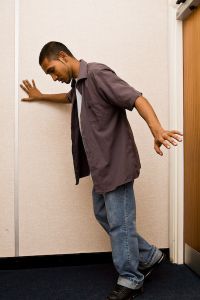

MedFriendly®


Abasia
Abasia is an inability to walk that is caused by poor coordination
of muscles. There are several different classifications of abasia
including choreic abasia, paralytic abasia, spastic abasia,
trembling abasia, and ataxic abasia. Choreic abasia is caused
by chorea of the legs. Chorea is involuntary, irregular, dance-
like movements of the arms, legs, and face.
Paralytic abasia is caused by paralysis of the leg muscles.
Paralysis is loss of movement and/or sensation. Spastic abasia
is caused by spastic stiffening of the leg muscles. The term
“spastic” refers to spasms, which are one-sided, long-term
muscle contractions. A contraction is shortening and thickening
of the muscles. Trembling abasia is caused by trembling of the
legs. Ataxic abasia is s difficulty walking due to difficulty
coordinating movements of the legs.
FEATURED BOOK: Principles of Neurology by Adams & Victor
Abasia often occurs alongside astasis, which is an inability to stand. When this happens,
it is referred to as astasia-abasia. Neurological conditions that can cause this include
stroke, cerebellum damage, multiple sclerosis, Parkinson’s disease, and normal pressure
hydrocephalus. A stroke is a burst artery or a blockage of an artery in the brain. The
cerebellum is an area in the back, bottom part of the brain that plays an important role in
movement and coordination.
"Where Medical Information is Easy to Understand"™
Multiple sclerosis is a condition in which the body attacks its own
myelin, resulting in multiple areas of abnormal patches (also known
as plaques or sclerosis) in the brain and/or spinal cord. Myelin is a
fatty substance in the brain and spinal cord that helps transmit nerve
impulses quickly.
Parkinson's Disease is a type of brain disorder that leads to serious
difficulties with muscle movements. Hydrocephalus is a condition in
which there is an abnormal increase in cerebrospinal fluid inside the
head. CSF is the cushiony fluid that protects the brain and spine
and helps distribute nutrients to these structures.

A man with abasia,
causing him
to hold onto the wall.
While these neurological causes of astasia-abasia exist, the term is also used to refer to the unusual
dramatic way in which some patients walk due to psychiatric factors, in which they lurch wildly in different
directions, often bump into walls, but do not fall unless someone or something soft is nearby to catch
them. Abasia comes from the Greek word "a" meaning "to do without," and the Greek word "basis"
meaning "step." Put the two words together and you have "to do without steps."















